Key Takeaways
- By establishing high-demand master's degree programs in Kigali, Rwanda, Carnegie Mellon graduates students having critical skills valued throughout East Africa.
- Faculty and students at the new campus reside in the Kigali area and conduct research on boosting local infrastructure, including energy systems and IT for healthcare and business.
- This case study describes the new campus and the technology that supports it.
Kristi DePaul, Marketing Manager, EDUCAUSE Learning Initiative and Next Generation Learning Challenges
[EDUCAUSE staffer Kristi DePaul, a Carnegie Mellon graduate, jumped at the chance to investigate and explain the university's new Rwanda programs when she learned of the initiative from the EDUCAUSE Review editor. This is her summary report. —Ed.]
The prospect of a well-known research university in the United States adding an overseas campus can be a daunting one; myriad challenges often lie ahead in launching programs even within developed countries. When establishing a new campus in East Africa, however, such challenges can rise to an entirely different level.
In fall 2012, Carnegie Mellon University — a Pittsburgh-based institution with several domestic and foreign satellite campuses (and my alma mater) — established two master's degree programs in Kigali, Rwanda. The move signaled a significant shift in the university's prior record of seeking out existing (rather than emerging) tech hubs. It also marked the first time a U.S. institution of higher education had established a master's degree program with full-time faculty [http://www.cmu.edu/rwanda/faculty/index.html] residing in Africa. The initiative has multiple lessons for other campuses considering similar outreach in other countries.
Carnegie Mellon University Rwanda
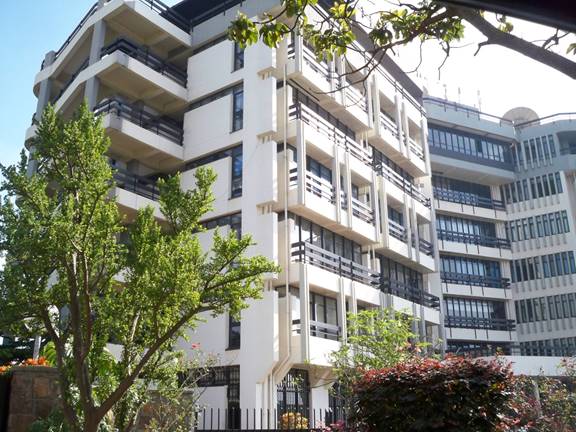
The Telecom House, site of CMU's satellite campus in Kigali, Rwanda
CMU Rwanda occupies the fourth floor of the Telecom House in Kigali. Students there can choose between a master's of science degree in information technology or electrical and computer engineering. University officials have stated that the coursework, practicums, and internships offered provide students with critical skills valued by industry throughout East Africa; students enrolled in the competitively ranked programs undergo the same training as those studying on the Pittsburgh campus.
Current research areas at CMU Rwanda focus on boosting local infrastructure, including energy systems and IT for healthcare and business. To ensure that research and curricula in Rwanda remain relevant to Africa, faculty and students engage with local companies and multinational corporations on a continual basis. Companies that have recruited CMU students for internships in East Africa include General Electric, IBM, Marriott, Microsoft, VISA, and Voxiva, among others.
CMU Rwanda students emphasize the importance of studying IT locally. Said recent ICT graduate Merhab Twahira, "There are solutions that are meant for different communities, for different places. We have to develop solutions that are acceptable for people in East Africa." Andrew Kinai, a student with an entrepreneurial focus who has since graduated, agreed: "It's very important not to be uprooted from the local ecosystem, since I want to run a small business on the side."
Although Rwanda's average school life expectancy — the amount of time the typical student spends in formal study attending school — is only 10 years,1 greater access to higher education programs could change that. The focus remains on offering practical skill-building opportunities that help CMU Rwanda graduates secure jobs in this urban center poised for technological growth. The shared anticipation for the programs is increased economic vitality for the region.
Bruce Krogh, the inaugural director of CMU Rwanda, underscored the university's presence as "the only way to understand the region's technology needs." He explained, "Creating a long-term education program is critical, because it gives students time to analyze problems and develop solutions in the context in which they occur."
Technology: Central to Success
Technology for CMU's Rwanda campus was carefully designed with local capabilities and infrastructure limitations in mind. (For example, the original timeline for the campus's opening was extended in order to procure and further test equipment, and to account for unexpected customs delays.) When everything was ready to go, Josh Emerson, senior network design engineer in CMU's Computing Services department, recalls receiving an e-mail asking him to be on a flight within the week. The team of two also included Chad Ziccardi, principal systems engineer in the university's electrical and computer engineering (ECE) department. Explained Emerson, "We built the entire infrastructure in our lab in Pittsburgh and worked closely with the ECE department in doing a lot of testing." He added, "When we were ready, we grabbed our configuration files and our passports." Emerson and Ziccardi traveled to Rwanda for installation, set-up, and initial testing of equipment. It was Emerson's first trip outside the United States.
As a member of the university's network design group, Emerson has a hand in planning any new network, which involves deciding on the right level of connectivity and suite of equipment, developing an overall configuration, and ensuring that everything is running. In a tech relay of sorts, his team manages the initial deployment and any modifications, then hands things off to network operations staff that locally handle all supports for the building.
Under direction from CMU CIO Steve Huth, Emerson and Ziccardi spent 10 days working alongside Johnson Nkurunziza, IT manager for the Rwanda campus.
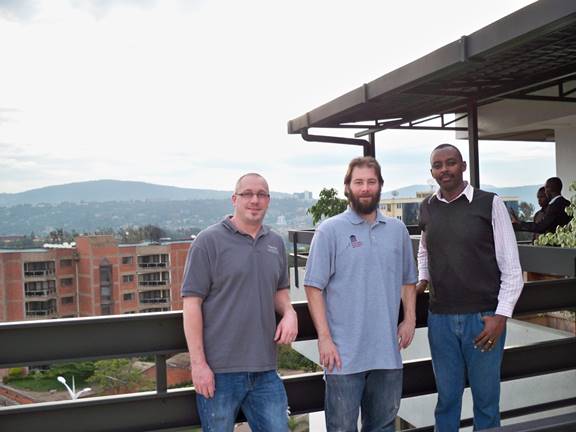
CMU IT staff members Josh Emerson, Chad Ziccardi, and Johnson Nkurunziza onsite in Rwanda
During the initial installation, all virtual infrastructure was to be placed in the building's data center. However, no pathway existed from the campus's location on the fourth floor to the data center on the first floor. At that point, the campus was already open, so Emerson and Nkurunziza had to work quickly and closely with the building staff and the Internet service provider to secure fiber to be installed between the floors. "Naturally, all of our infrastructure needed to talk to one another," Emerson explained. "In order to make that happen, six strands of single-mode fiber was installed, literally by the ISP guys drilling into the walls."
Ensuring smooth operations requires significant cooperation between the Pittsburgh and Kigali campuses; Emerson noted he is in contact with Nkurunziza on an almost daily basis. "To this day, if Johnson or I have any questions, we go back-and-forth. We just made an IP cutover for the infrastructure a week ago, to move our network over to a more stable pathway as per our ISP recommendations."
The IT staff has constructed an infrastructure that matches the campus's current needs, while simultaneously anticipating future expansion. CMU provides off-campus VPN access for students, faculty, and staff, and a management VPN for the IT team's use in case any issues require them to connect remotely. They also have a site-to-site VPN tunnel between CMU Pittsburgh and CMU Rwanda for any traffic between the campuses. Other Internet traffic doesn't transverse the tunnel, only site-to-site network traffic.
CMU Rwanda Campus: Tech Infrastructure
The campus's wireless network consists of two SSIDs:
- One WPA2-Enterprise with AES Encryption that uses Radius Authentication against Windows Active Directory for student, facility, and staff access
- A non-broadcast WPA-Personal (WPA2-PSK) guest access that uses a pre-shared key (which changes periodically)
Because of connectivity limitations, the wireless guest network is on a different IP range and has bandwidth-restricted Internet access only.
In addition, the Kigali campus uses:
- Two Cisco 5510 ASAs firewall modules configured in a failover pair for redundancy
- Five Cisco 2960 POE switches for networking both the wired/wireless networks
The CMU team also provides PoE power for 12 Aruba 135 access points managed by an Aruba 3200 wireless controller.
Aside from his immediate camaraderie with Nkurunziza and other staff, Emerson pointed out how much he enjoyed working with the people he met in Rwanda. "Everyone really went out of their way to make us feel welcomed and at home," Emerson said. "It was truly one of the greatest experiences in my life, that I hope to do again in the future."
What was the most rewarding part? Emerson cited the opportunity to help set up a campus in a place where students are so eager to secure a better future.
Campus Features
The existing campus, although small, includes various modern classrooms, labs, and offices. Most students have their own laptops (a mix of Windows and Macs), and as is common across the African continent, many regularly connect to the Internet via mobile devices.
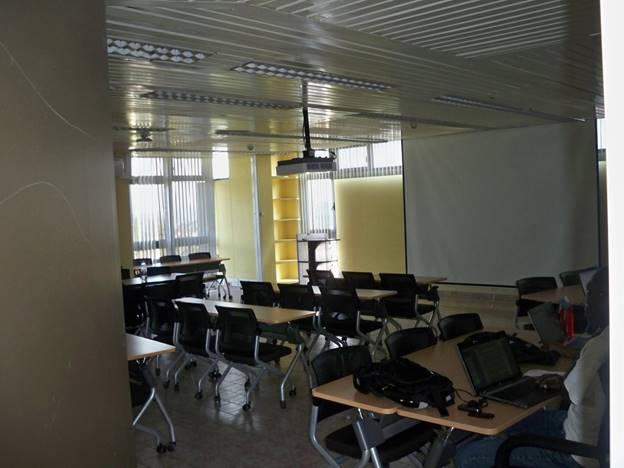
Classroom
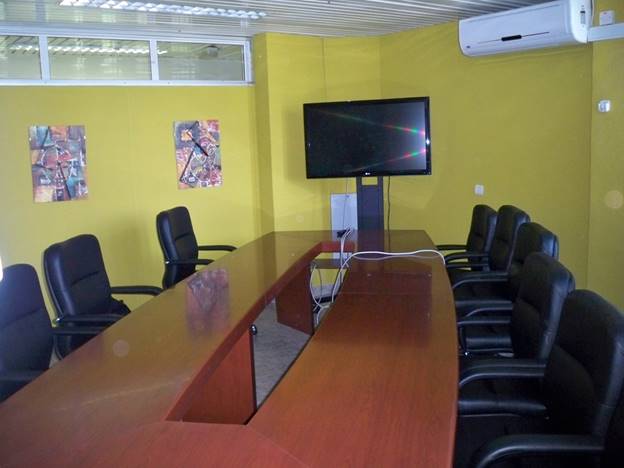
Web conferencing room
Future Plans
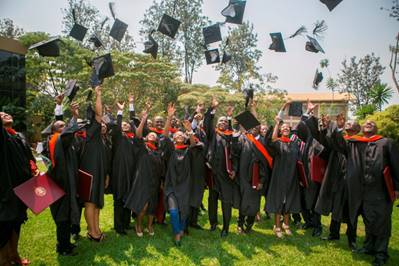
The inaugural graduating class of CMU Rwanda, July 2014
The IT and ECE programs currently accommodate 45 students, but are growing. Plans are in the works for a move in late 2016 from the current location to a new one that will accommodate further expansion and a larger student population. In the summer of 2014, the campus reached a big milestone: its inaugural graduating class. James H. Garrett Jr., dean of Carnegie Mellon College of Engineering, noted that the class was filled with "remarkable young men and women who were prepared to enter industry and become entrepreneurs. […] We are excited about their potential to make significant contributions to IT in East Africa and the world."
Acknowledgments
Many thanks to the many people who provided information about CMU Rwanda, especially Josh Emerson, who gave so generously of his time and knowledge to make this story possible.
- U.S. Central Intelligence Agency, Africa: Rwanda, The World Factbook.
© 2015 Kristi DePaul. The text of this EDUCAUSE Review article is licensed under the Creative Commons Attribution 4.0 license.
